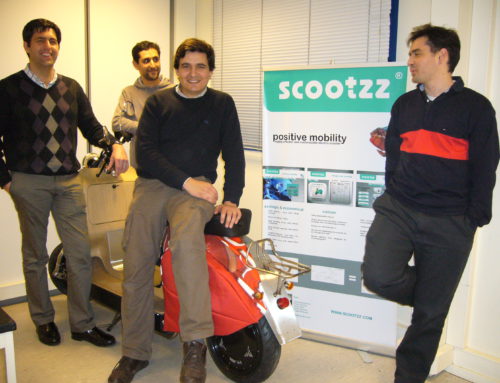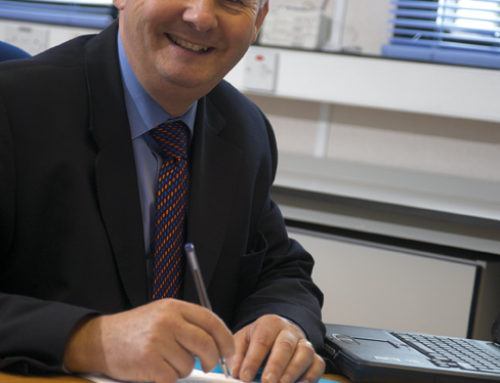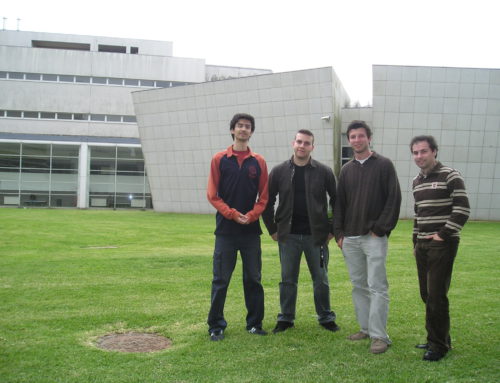MIETE-BLOG: André Fereira, José Pinto and Rui Gonçalves, thank you for your time and availability. You are currently PhD students at the MAP-I Doctoral Program. Can you please give us a very brief overview of your academic and professional background and of your motivation to enroll in te MAP-I PhD Program?
André Ferreira: I have a degree in Software Engineering from University of Minho and worked for over a 1,5 year in the industry before I enrolled at MAP-i Doctoral Programme under a BDE scholarship.
After finishing my degree it was my wish to undertake a PhD to experience work in research, focus my work in a specific area of Software Engineering and develop skilld and competences necessary in the process of achieving a PhD.
José Pinto: Since very young that I am enthusiast for new technologies and science. I joined the Computer Science course in Faculty of Sciences (Porto) as a way to deepen my understandings on computers and pursuit a career in science. At the end of this course, I was becoming more and more interested in applying all the technologies and models I’ve learnt into practical solutions. This happened when I started doing research at FEUP in the underwater systems and technology laboratory. The results of our projects are very directed to industry but always on the bleeding edge of science, which still makes me proud. While working in FEUP I also attended the Master’s course in Software Engineering (Engenharia Informática).
The next year I applied to a doctoral scholarship and MAP-i as way to further improve my scientific skills. MAP-i is a conjoint course of Minho, Aveiro and Porto universities, with lecturers from the various institutions. I found this very appealing since I would have lectures from teachers from both my previous faculties and still get to know more people doing research in similar areas.
Currently I am starting my thesis in Cooperative Robotics, a theme that is very related with what we are doing in FEUP.
Rui Gonçalves: Since young my education has been deeply related with Computer Science. At my high school I had the technological course in informatics (10º-12º). It was very stimulating at that time, when computers were considered somehow new, the exchange of ideas with other young students interested in the same area. Therefore my biggest motivation, at the time, to choose Computer
Science in Science Faculty, for the graduation course, was to gain a deeper knowledge in the field. For my professional internship in the Computer Science course I was able to choose a working plan that combines two of my favorite technologic areas: Virtual Reality with Robotics at Oporto Faculty of Engineering (FEUP). While working on FEUP I had the chance to do the master course in parallel research. Again Robotics and Virtual Reality were the main focused aspect in the course, along with Software Engineer. In continuation of my background, as a researcher who strongly believes is making a good contribution on the field, the assertive step was to enroll in the new and promising MAP-i conjoint doctoral programme. During this year, on MAP-I, I met very talented people as well as new technologies, ideas and problems to be solved.
MIETE-BLOG: You also joined one of MIETE Courses, namely “Business Creation and Development” in the scope of the so-called Cultural Option of the MAP-I PhD Program. What was your main motivation to enroll in a MIETE Course?
André Ferreira: I have a particular interest in the areas of entrepreneurship, innovation and business development. MIETE
gives access to selected and structured contents that focus in these specific areas.José Pinto: Currently, I am in a world balanced between science and technology but I always wanted to apply my knowledge into a product that would sell (by adding real world value to people). My main motivation to enroll in MIETE was learning what it takes to create a technology startup for this possibly future need.
Rui Gonçalves: The laboratory where I’m currently doing research is launching a “startup” enterprise (MST). This enterprise is related with underwater services and technologies. Our lab (LSTS-FEUP) is developing, in parallel, Technologies in other fields which are also potential “startups”. Nevertheless all the process related with business creation and associated concepts are relevant to address, even if it only used as defense knowledge. I have take this opportunity provided by MAP-I and MIETE to gain some bases in this area, which turned out to be very motivating for future cognitive deepening.
MIETE-BLOG: The semester is closing within the next couples of week which means that, by now, you should already have your own judgement on whether it was good for you to make this MIETE course. Can you please share your thoughts with us.
André Ferreira: I can say, until now, it has been a very positive experience, it allowed a first contact with the early processes of business creation. The faculty with industrial experience permits
to conciliate of theory with actual experiences in the field.José Pinto: Definitely yes. This course showed me part of I was looking for (only a part because I could only attend one discipline). I learned most of the processes needed to envision and create a solid business in our (and other) areas. I got to know how the market evolves, what is a viable product, where and how to get funding, etc.
Rui Gonçalves: I have the opinion that all the concepts and methodologies given during this course (”Criação e Desenvolvimento de Negócio” – “Business Creation and Development”) are considered of primordial importance to take the first steps in business creation and startups conception. The subjects itself were interesting and the enthusiastic way they were presented provided a motivating environment to enlarge our horizons in business issues.
MIETE-BLOG: (Pergunta so’ para o Andre’, se se sentir confortavel em responder): Andre Ferreira, unlike your colleagues, you decided to enroll in the first two courses of the MIETE-Foundations sequence. Can you share with us your motivation for such decision. Would you recommend other PhD students to follow your example?
André Fereira: The decision to enroll in MIETE-Foundations is motivated by the will to have a full understanding of the process of business creation. The courses focus in a very practical and process oriented approach. In the future, if possible, I would like to work in business development and innovation.
MIETE-BLOG: André Fereira, José Pinto and Rui Gonçalves, thank you all again for your precious time. One last question, what did you like most and what did you like less about your experience in MIETE?
André Fereira: I enjoyed particularly the classes of financial analysis. I have no specific dislike until now.
José Pinto: What I liked most was the ambience of the room (students and teachers). The lectures were given in a relaxed but interesting way, for people from the most disparate areas but one dream in common. What I liked less was having to opt for a single company related to one of the technologies by the end of the “Business Creation and Development” course.
Rui Gonçalves: Most: I would like to remark the dynamic and enthusiastic way the subjects were presented and discussed during the classes.
Editor’s Closing Remark: André Ferreira, José Pinto and Rui Gonçalves enrolled in the course “Business Creation and Development”. By the end of this course, students should have developed the following skills (be able to): 1) Develop a strategic plan adjusted to the reality of a new technology-based enterprise; 2) Have an holistic and integrated view of the enterprise involving all its resources and stakeholders; 3) Know how to finance a technology-based enterprise.
This course is part of MIETE Foundations (Figure below) that André Ferreira decided to enroll. The actual business-oriented hands-on project that has led to the creation of new businesses launched by former MIETE students (MIETE-Ventures) is developed along the upper sequence of 3 courses that starts with “Project for Opportunity identification and Evaluation”.

Figure: MIETE-Foundations Courses (part of MIETE 2nd Cycle)




